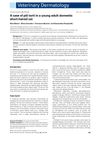 6 citations,
February 2013 in “Veterinary Dermatology”
6 citations,
February 2013 in “Veterinary Dermatology” A young cat had a rare hair condition with twisted hair shafts but stayed healthy.
 3 citations,
February 2013 in “Bangladesh Journal of Medicine”
3 citations,
February 2013 in “Bangladesh Journal of Medicine” Low iron levels are linked to hair loss in women.
 1 citations,
July 2016 in “British Journal of Dermatology”
1 citations,
July 2016 in “British Journal of Dermatology” Men with a certain type of hair loss often use facial moisturizers, and a specific antibiotic treatment may help another hair condition.
 October 2024 in “Journal of Education Health and Sport”
October 2024 in “Journal of Education Health and Sport” Alopecia areata treatment should be personalized, using topical or systemic therapies based on severity, with promising options like JAK inhibitors needing more research.
 August 2024 in “OSMANGAZİ JOURNAL OF MEDICINE”
August 2024 in “OSMANGAZİ JOURNAL OF MEDICINE” The visfatin GT genotype may increase the risk of Alopecia Areata.
 July 2024 in “Dermatology Practical & Conceptual”
July 2024 in “Dermatology Practical & Conceptual” COVID-19-related hair loss may have unique features compared to hair loss from other causes.
 November 2023 in “Frontiers in cell and developmental biology”
November 2023 in “Frontiers in cell and developmental biology” Hair aging is caused by stress, hormones, inflammation, and DNA damage affecting hair growth and color.
 September 2013 in “Neurodegenerative disease management”
September 2013 in “Neurodegenerative disease management” Teriflunomide is effective and generally safe for treating relapsing multiple sclerosis, reducing relapse rates and disability progression.

Topical minoxidil helps treat hair loss in teens, but more research needed for safe options.
 17 citations,
January 2020 in “Skin appendage disorders”
17 citations,
January 2020 in “Skin appendage disorders” Certain diets may help with hair growth in people with different types of hair loss.
 September 2024 in “Skin Research and Technology”
September 2024 in “Skin Research and Technology” AFM can help diagnose lichen planopilaris by identifying specific hair structure changes.
 11 citations,
January 2022 in “Journal der Deutschen Dermatologischen Gesellschaft”
11 citations,
January 2022 in “Journal der Deutschen Dermatologischen Gesellschaft” Alopecia areata is a chronic condition causing hair loss, with new treatments targeting the immune system showing promise.
3 citations,
September 2021 in “BioEssays” Dandruff might be caused by changes in how hair follicles naturally release oils and an immune response to this imbalance.
717 citations,
June 2010 in “Nature” Alopecia areata involves both innate and adaptive immunity, with specific genes linked to the disease.
 2 citations,
July 2023 in “Journal of Cosmetic Dermatology”
2 citations,
July 2023 in “Journal of Cosmetic Dermatology” The topical treatment reduced hair loss and improved hair growth in patients with certain types of hair loss.
 September 2024 in “Egyptian Journal of Dermatology and Venerology”
September 2024 in “Egyptian Journal of Dermatology and Venerology” Low-energy fractional CO2 laser therapy significantly improves hair regrowth in women with female-pattern hair loss.
 2 citations,
June 2023 in “Skin Research and Technology”
2 citations,
June 2023 in “Skin Research and Technology” Yellow dots and short vellus hairs are the most common signs of Alopecia Areata (AA), and trichoscopy can help diagnose AA and track treatment progress.
 2 citations,
May 2022 in “Cosmetics”
2 citations,
May 2022 in “Cosmetics” Further research is needed to understand how the microbiome affects hair loss in Alopecia Areata.
1 citations,
May 2021 in “Dermatology practical & conceptual” Iontophoresis with growth factors safely and effectively promotes hair regrowth without discomfort.
1 citations,
January 2021 in “European journal of medical and health sciences” PRP shows promise for treating hair loss, but more research is needed.
 July 2022 in “http://isrctn.com/”
July 2022 in “http://isrctn.com/” Adding a cosmetic gel with caffeine, taurine, and growth factors to standard hair loss treatments could improve results.
 November 2022 in “IntechOpen eBooks”
November 2022 in “IntechOpen eBooks” Hair loss can significantly impact a person's mental health, causing issues like anxiety and depression, and stress can trigger hair loss.
 26 citations,
July 2019 in “Dermatology and Therapy”
26 citations,
July 2019 in “Dermatology and Therapy” The conclusion is that genetic testing is important for diagnosing and treating various genetic hair disorders.
14 citations,
July 2017 in “Fitoterapia” Oleanolic acid promotes hair growth by increasing cell proliferation through the Wnt/β-catenin pathway.
 1 citations,
December 2022 in “Pharmaceuticals”
1 citations,
December 2022 in “Pharmaceuticals” Noni fruit extract, specifically the FEA-3 sub-fraction, can increase hair growth and reduce baldness in male rabbits, potentially acting like common hair loss treatments.
 1 citations,
October 2016 in “Iranian journal of psychiatry and behavioral sciences”
1 citations,
October 2016 in “Iranian journal of psychiatry and behavioral sciences” Sertraline, an antidepressant, may rarely cause hair loss.
 October 2016 in “Iranian journal of psychiatry and behavioral sciences”
October 2016 in “Iranian journal of psychiatry and behavioral sciences” Sertraline, an antidepressant, may cause hair loss in rare cases.
13 citations,
July 2018 in “Obesity surgery” Over half of patients had hair loss after weight-loss surgery, especially women, linked to low zinc and vitamin B12 levels.
 7 citations,
December 2021 in “Pharmaceutics”
7 citations,
December 2021 in “Pharmaceutics” Natural products like plant extracts can help promote hair growth and could be used to treat hair loss.
 5 citations,
September 2017 in “Plastic and Aesthetic Research”
5 citations,
September 2017 in “Plastic and Aesthetic Research” Low dose cyclical nutrition therapy can consistently and safely improve hair growth and density without needing anti-androgens.
























